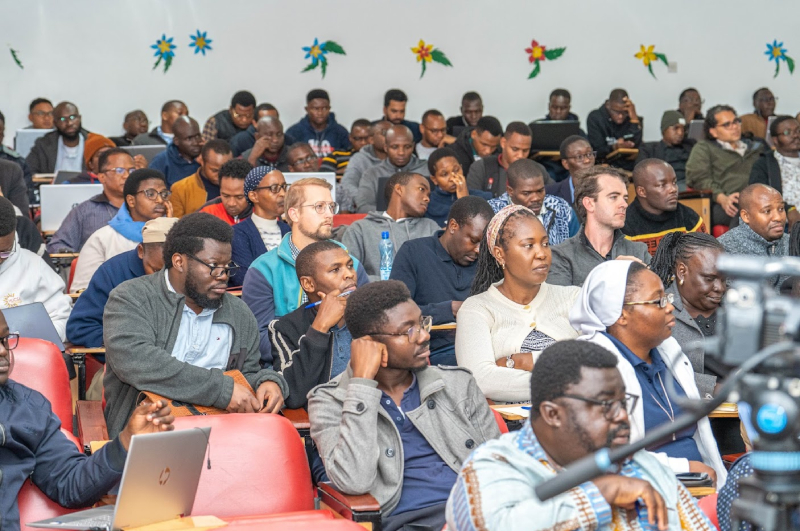




On January 29, 2025, Hekima University College (HUC) hosted a transformative conference titled “The Future of African Theology in a Continent Longing for a New World Order.”
The event brought together theologians, scholars, and Church leaders to critically examine the role of theology in addressing Africa’s most pressing challenges. With a focus on bridging spiritual ideals and real-world issues, the conference underscored the transformative potential of African theology in fostering a just, inclusive, and equitable society.
The gathering featured profound insights from distinguished speakers, including Rt Rev Matthew Hassan Kukah, Bishop of the Catholic Diocese of Sokoto, Nigeria, and Rt Rev Rodrigo Mejia SJ, Emeritus Vicar Apostolic of Sodo, Ethiopia, and holder of the African Chair in Theological Studies at HUC (2024-2025). Their contributions highlighted HUC’s commitment to shaping theological discourse that resonates both locally and globally, offering a prophetic vision for Africa’s future.
In his opening remarks, Fr Marcel Uwineza SJ, Principal of HUC, set the tone for the conference by emphasizing the critical intersection between theology and Africa’s socio-political realities.
“African theology, as we know it today, is much more than an academic discipline; it is a living, breathing conversation that reflects the experiences, hopes, and dreams of a people whose history has often been marginalized in the larger global narrative,” Fr Uwineza stated.
He called for a theology that challenges systemic inequities and global injustices while affirming the dignity of African identity. “More than ever before, African theology is stepping forward to offer a prophetic voice in the global conversation on justice, equality, peace, and liberation,” he added.
Bishop Matthew Hassan Kukah, a prominent advocate for justice and human dignity, delivered a powerful address titled “Why the Church Cannot Be Spectators.” He examined the historical and cultural gaps that have shaped Africa’s struggles with identity and development, urging the Church to reclaim its role as a catalyst for change.
“Colonial historiography presents a distorted version of history,” Bishop Kukah remarked. “The British, for instance, never explicitly stated that they conquered Nigeria or Kenya. Instead, they framed their actions as the ‘pacification of the tribes.’ It was only later that the first generation of African historians began to redefine these events as British conquests.”
He criticized the Church for its occasional disengagement, asserting, “We can no longer afford to be mere spectators in the political, social, and economic development of Africa. Justice must be central to our understanding of politics, theology, and social engagement.”
Bishop Kukah also highlighted the Church’s potential to drive moral and social change, referencing the legacy of St. John Paul II and his influence on Poland’s solidarity movement. “The Catholic Church, with its 2,000-year history of addressing societal challenges, has the capacity to drive meaningful change. The key is to harness this wisdom effectively,” he said.
Bishop Rodrigo Mejia SJ likened theology to yeast, emphasizing its role as a catalyst for transformation in both the Church and society. He outlined a model for addressing Africa’s challenges based on listening, reflection, and action.
“True transformation begins with listening, hearing the cries of the people, understanding their pain, and allowing their voices to shape our responses,” Bishop Mejia said.
He stressed the importance of discernment in theological practice, advocating for a reflective approach that avoids quick fixes. “Reflection is the bridge between listening and action. It allows us to weigh our responses against the values of justice and peace,” he explained.
Bishop Mejia also called for a theology deeply rooted in Africa’s spiritual and cultural identity, capable of addressing systemic challenges while offering hope. “African theology must move beyond looking to the past and instead focus on how culture evolves with each generation,” he said.
The Role of African Theology in a Changing World
The conference grappled with the implications of a rapidly changing global order, exploring how theology could bridge the gap between Africa’s spiritual richness and its socio-political challenges.
Fr Uwineza captured the essence of this challenge, stating, “Africa has long been a land of paradox, rich in natural resources but burdened with systemic poverty, politically volatile but brimming with hope, deeply spiritual yet constantly confronted by religious and ideological tensions. In this context, African theology finds itself at a crossroads.”
Bishop Kukah echoed this sentiment, emphasizing the human cost of conflict and injustice. “The scale of human loss in Africa is often reduced to impersonal statistics, but these numbers represent real lives—our brothers, sisters, and cousins. This realization demands a sense of urgency and practical solutions,” he said.
The conference concluded with a resounding call to action, urging African theologians and Church leaders to embrace their prophetic role in shaping a more just and equitable society. By addressing Africa’s historical gaps, fostering dialogue, and investing in education, African theology can serve as a beacon of hope and transformation in a rapidly changing world.
As HUC continues to lead the charge in theological discourse, the insights from this conference will undoubtedly inspire a new generation of leaders to reimagine Africa’s future—one rooted in justice, dignity, and liberation.
Adapted from: Cisa News Africa
Related Articles
Select Payment Method
Pay by bank transfer
If you wish to make a donation by direct bank transfer please contact Fr Paul Hamill SJ treasurer@jesuits.africa. Fr Paul will get in touch with you about the best method of transfer for you and share account details with you. Donations can be one-off gifts or of any frequency; for example, you might wish to become a regular monthly donor of small amounts; that sort of reliable income can allow for very welcome forward planning in the development of the Society’s works in Africa and Madagascar.
Often it is easier to send a donation to an office within your own country and Fr Paul can advise on how that might be done. In some countries this kind of giving can also be recognised for tax relief and the necessary receipts will be issued.

